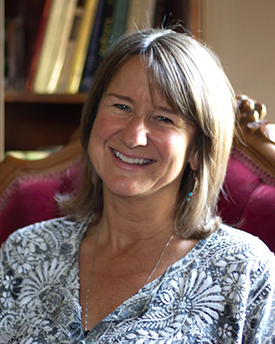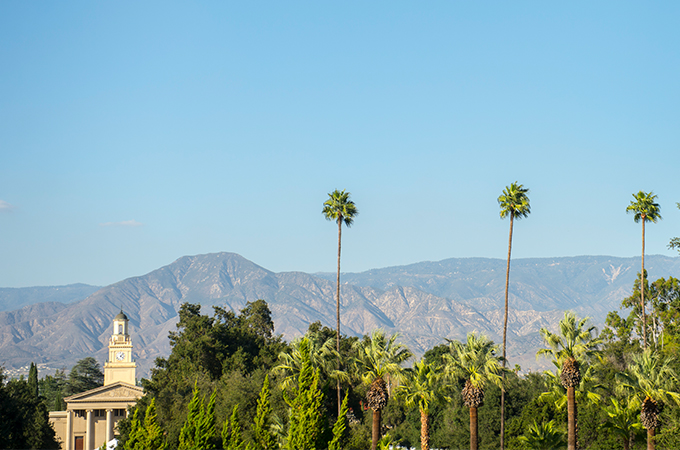We have little control over viruses, earthquakes, tornadoes, and so forth. But how we approach a calamity is totally up to us. Gracefully or fearfully—the choice is ours.
Caution or fear, what will it be? Caution is gracious and prevents infection. Fear, however, is draining and infectious. It weakens our immune and social systems. That’s why yelling “fire” in a theater is illegal—people die from the trample.

Our present work is to take the panic out of p-a-n-d-e-m-i-c, and home in on “dem,” which means people. People are at the center of this moment—not a virus. How do we keep our focus in the right place? Let’s not lose our humanity in the race to save our health!
We can’t change the fact that coronavirus has taken possession of the collective psyche, but we can choose where we put our attention. A student in my office said today, “I can’t concentrate. I sit down at my computer to write a paper, and what grabs my attention are all the news updates flashing across the screen. My parents call me and say crazy things like, ‘Don’t breathe in public!’ Friends text me the latest nightmare from their newsfeed. Everyone’s in freak-out mode. How do I stay sane?”
Things are indeed crazy out there. Someone sent me a photograph of a bathroom so full of stockpiled toilet paper rolls, you could barely see the toilet! People are pushing and shoving each other to grab up the last can of soup or bottle of sanitizer!
While some of us were hoping that another sort of phenomenon might capture the public imagination and unite humankind into a global movement (educating our children, caring for our planet), it turns out to be a virus. Oh well. In meditation practice, we learn to work with whatever arises.
To be sure, the virus has its difficulties, as the bombardment of news “updates” won’t let us forget for a second. But what about the hidden gifts?
Creative edge.
The pandemic has halted our daily rhythms, interrupted our routines (maybe some of them were actually ruts?). It has forced us to learn new ways of doing the same tasks.
Two weeks ago, for instance, the IT staff at the University asked me to learn Webex, a new online video technology, and I refused. I just didn’t feel ready to take on that challenge. Guess what? Over the weekend, because the virus has required me to shift all of my classes to online modality, I learned how to do Webex! As Plato told us, “Necessity is the mother of invention.” Sometimes the only reason we try new things is because we’re forced to. Now is a good time to explore new ways to offer our talents and services, to forge new ways to be in community, stay connected, and educate our children.
Contemplative life.
As our fast-paced culture comes to a standstill, can we embrace this inward shift? In spiritual literature, it’s the shift from an “active” to a “contemplative” lifestyle. My colleagues and I are always complaining about how “busy” we are and “in need of a retreat.” A virus wasn’t what we were hoping for, but it’s a slowdown all the same. As we let go of committee meetings, conferences, and even commencement, we find ourselves in a different space. “Stay at home, avoid crowds”—an introvert’s dream-come-true.
Introvert or otherwise, we all have an opportunity to go within and heal the things that are actually deadlier than a virus: our inner stress, anxiety, hatred, fear, resentment, envy, anger, greed, craving/addiction, hopelessness, and shame.
Caring for people, including ourselves.
What does it look like to focus on “people” instead of “panic”?
Caring for ourselves and one another. Here are some suggestions that work for me, and you’ll surely have your own to add….
Physical
Our physical body has an immune system that naturally protects us. We can support our immune system in easy ways:
Wash hands often.
Minimize exposure by staying home when possible. When going out, take the recommended precautions.
Drink hot teas, especially made of green tea, ginger, cayenne pepper, lemon, or turmeric. A favorite elixir: fresh-squeezed ginger, honey, and lemon.
Eat vitamin-rich foods that we enjoy (and can find!). And: any food that’s homemade is a real boost because it contains our caring within it.
Move our bodies in favorite ways: stretching, gardening, house cleaning, walking, dancing, yoga, moderate exercises, lovemaking. Try an online yoga or dance video.
Watch funny movies and listen to good comedians. Laughter truly is the best medicine and can make all the difference for our immune system, exemplified in the book by Norman Cousins, Anatomy of an Illness, whose fatal illness was healed through laughter as the vital medicine.
Listen to Mozart (demonstrated to foster healing) and other music that we enjoy.
Spend time outside. Look at the sky. Feel the earth under our feet. Smell the Springtime, a season of new beginnings.
Mental
Refrain from panic. Common sense precautions are positive and sufficient.
Find the humor in every situation. Someone sent me a picture of earrings made of little toilet paper rolls!
Instead of fearing death, let’s face the fact of mortality. As my beloved teacher, Dr. David R. Hawkins liked to say: “None of us gets out of here alive!” One thing we learn in meditation practice is, “Until you face your fear of dying, you’ll never really live.” Many spiritual traditions include a “death meditation” practice. In my Meditation class at the University, we learn a death meditation in the beginning of the semester. The students are nervous and complain, “Do I have to die before mid-term?!” But afterward they say they feel “reborn.” When we go ahead and face our fears, we are freer.
“When it’s your time to go, you go. If it’s not your appointed time, nothing can make you die!” This is what I’ve heard from all of the spiritual teachers I’ve met. It’s also in our collective wisdom, as in the classic story, “Death in Tehran.” (Skip a few virus updates and Google this story instead. Take time to read and contemplate it.)
Cultivate a positive frame of mind. What’s the good in avoiding toxic physical environments if our own mental environment is poisoned by terror, resentment, and self-pity?! This mental shift takes effort and focus, but it’s worth it.
Our experience of life depends completely upon the inner attitude we take about it. In my Compassion class, we read Viktor Frankl’s classic book, Man’s Search for Meaning, based on his experiences in Nazi concentration camps. The students and I have been working to put into practice Dr. Frankl’s essential teaching: “everything can be taken from a man but one thing: the last of the human freedoms – to choose one’s attitude in any given set of circumstances, to choose one’s own way.”
Spiritual
Welcome “lockdown” as an opportunity for meditation, prayer, and reflection. All spiritual paths have a season for inner communion. Jews have their “sabbath.” Christians have their “lenten season.” Native Americans have their “vision quest.” The Dao De Jing says to be still and “let the mud settle.” Simply taking a few moments each day to be aware of our breath helps to calm and clarify. Heartfelt prayer and loving intention can have a powerful effect. (For a summary of research, you can read the chapter with Dr. William A. Tiller, Stanford physicist, in my book, The Power of Love.)
“Don’t ‘ghost’ yourself!” This is what I tell the students in my Meditation class. Their generation says “They ghosted me” when someone ignores them or fails to show up for a date. Isn’t that what we often do to ourselves? Ignore our inner self? Go into oblivion by any means available? Being forced to spend more time at home gives a chance to re-connect with our deeper self.
Embrace the opportunity for self-discovery. Is there something to get honest about with ourselves? Is there an unlived potential that we’d like to explore? Is there anything we’ve been “meaning to get to” but haven’t yet? Now is the perfect time. Instead of spending our spare time studying the virus nonstop, we can learn something about our inner selves.
Read an inspiring book—or even just one profound sentence each day and contemplate it during the day.
Community
The gift of this shift is to experience that we are connected in ways we hadn’t even realized. We have a profound influence on each other. We can either bring the spirit of peace to others, or we can transmit fear. Let’s choose peace, humor, hope, clarity, and kindness.
It’s a good time to reach out to encourage others. “We’ll get through this.” Or to thank others for their contribution to our lives. “I really appreciate you. I couldn’t do it without you.” Or we can open up to a family member or person we live with, going deeper than usual: “How are we in our relationship? Is there anything you want to tell me about yourself? Anything we need to heal or forgive or do differently?”
Walking my dog this morning, I heard a mother say to her children who are “stuck” at home because the schools have closed: “It’s going to be a long 3 weeks if we can’t learn to get along!” One of the hidden gifts in “social distancing,” clearly, is the opportunity to have a deeper connection with those we live with.
Call someone who is homebound. Or someone we haven’t talked to in a while. I have several friends in their eighties and nineties who are on lockdown and not connected to the internet. The only way to reach them is by telephone, so I call them and we talk, laugh, sing, or cry for a few minutes.
Schedule a Zoom or FaceTime session with a few of the children we know who are at home. It can be a virtual “Show and Tell” or “Story Time”—fun for the kids, and a few moments of relief to their parents or guardians.
Write a letter of gratitude to an old friend or mentor. Schedule a Zoom or FaceTime to check-in and let people know we care. There are many ways to tell others how much they mean to us.
Find a community of caring and sharing online. For example, there are thousands of 12-step meetings online, all anonymous. Whether we suffer from anxiety, addiction, debt, depression, loneliness, codependency—literally any type of human suffering—we can find an online support community of other people who have healed through our same problem. All we need is the humility to reach out.
Be a conduit of care to other people online. My friend Mary Cimiluca (the representative for the Viktor Frankl family) is an example. She went through a devastating personal crisis of grief and suicidal depression after she lost all of the people close to her. She came out of it and flourished in a new chapter of her life, but she never forgot what she’d been through. After she passed away, it was discovered that she’d been an online mentor to hundreds of sufferers of depression through a support group she’d created. They said they wouldn’t have gotten through their darkest hour without her love and support.
Bottom Line
At any point, we can choose to refrain from “panic” and focus on the “people” in our life (including ourselves). Whatever we give our attention to—that’s what grows.
Let’s nurture our humanity, not lose it!
Learn about Fran Grace, her book The Power of Love, or the Religious Studies program at the University of Redlands.






